Dreaming of exploring Vietnam but worried about the language barrier? Whether it’s the bustling streets of Ho Chi Minh City, the serene beauty of Halong Bay, or the mouthwatering local dishes, Vietnam offers an adventure you’ll never forget. Yet for many travelers, one question looms large: “Can I go to Vietnam without speaking Vietnamese?”
The answer is a resounding yes! In this blog, we’ll walk you through everything you need to know about navigating Vietnam without knowing the local language. From leveraging technology to understanding the level of English spoken in different regions, we’ll help you prepare for a seamless and enriching journey. Let’s dive in!
Why Visit Vietnam?
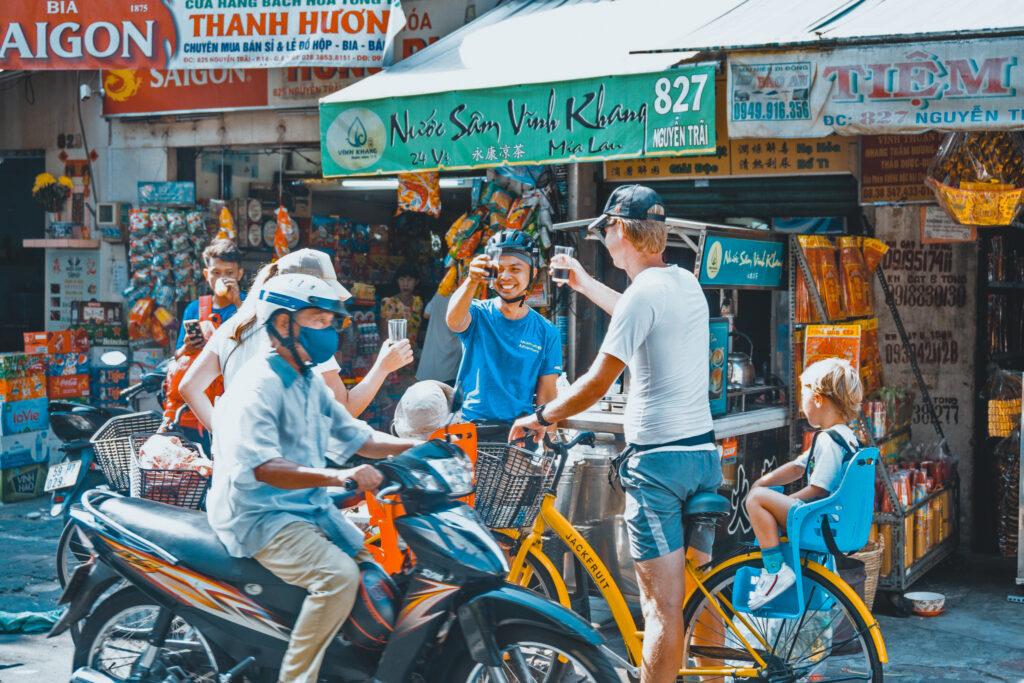
Vietnam is a land of vibrant contrasts and endless charm, making it one of the most captivating travel destinations in Southeast Asia. Whether you’re drawn to the hustle and bustle of its cities, the breathtaking beauty of its countryside, or its rich cultural heritage, Vietnam has something for everyone. Here’s why this Southeast Asian gem should be on your travel list, even if you don’t speak Vietnamese.
A Cultural Treasure Trove
Vietnam’s culture is a fascinating blend of traditions shaped by thousands of years of history and diverse regional influences. From the ancient streets of Hanoi’s Old Quarter to the imperial relics of Hue, Vietnam offers glimpses into a past filled with resilience and pride. Festivals like Tet (Lunar New Year) or the Mid-Autumn Festival immerse visitors in authentic local traditions, while Vietnamese hospitality ensures you’ll feel welcome every step of the way.

For example, Ho Chi Minh City is a cultural melting pot, home to landmarks like Chinatown’s Cho Lon and vibrant traditions that reflect its history as a trade hub. To discover the city’s cultural highlights, check out 20 Things to Do in Ho Chi Minh City or explore unique perspectives with 25 Unusual Things to Do in Ho Chi Minh City for hidden cultural gems.
World-Renowned Cuisine
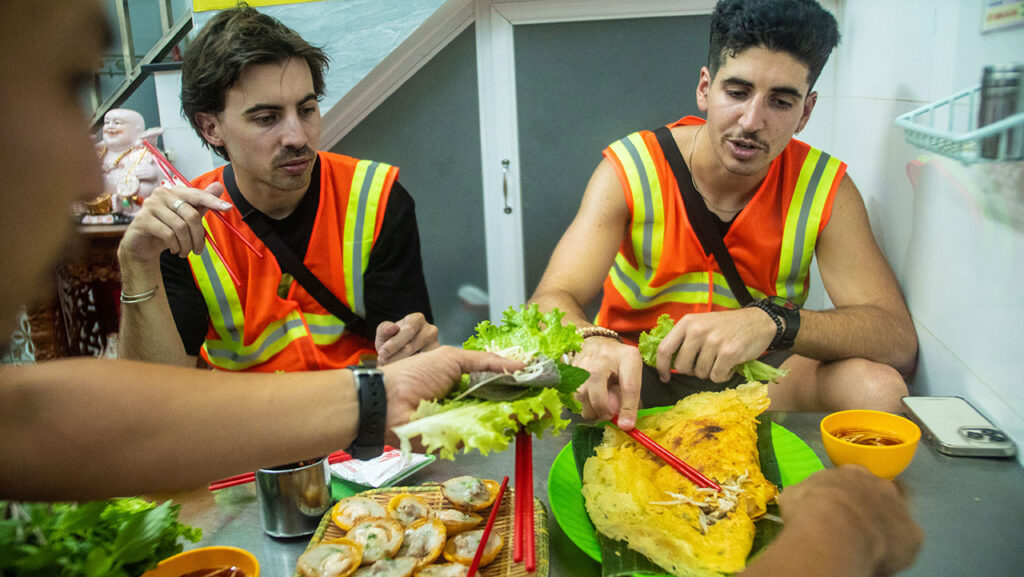
Food is at the heart of Vietnamese culture, and tasting the local cuisine is an adventure in itself. Imagine slurping a steaming bowl of Pho, at a street-side eatery, or sampling the diverse array of Vietnamese street food that lines the bustling markets. Each region boasts its own specialties—from the hearty dishes of Hanoi to the bold, spicy flavors of Hue and the sweet, vibrant tastes of Ho Chi Minh City.
A defining feature of Vietnamese cuisine is its use of fresh ingredients, especially aromatic Vietnamese herbs like cilantro, mint, and Thai basil, which elevate every dish with their unique flavors. Whether you’re a street food enthusiast or fine-dining connoisseur, Vietnam’s culinary scene is unforgettable and promises a journey for your taste buds unlike any other
Breathtaking Natural Wonders
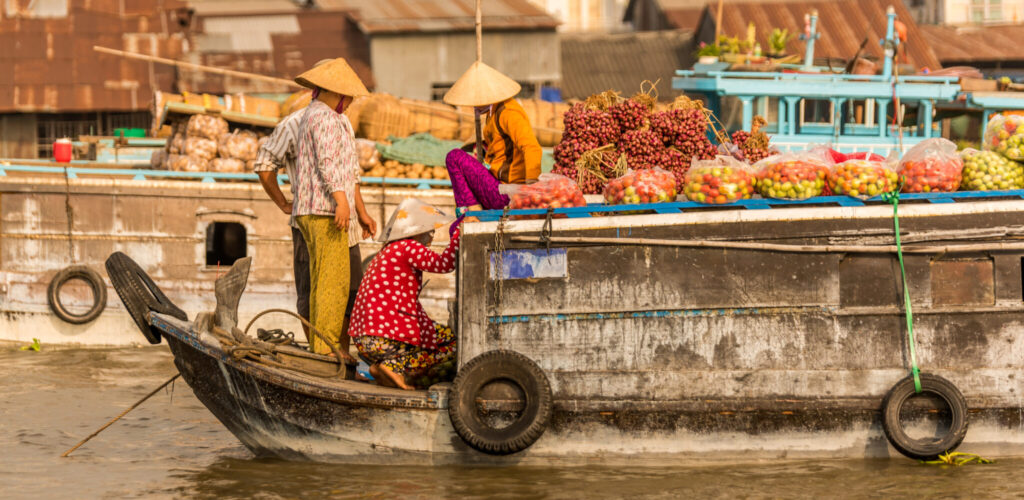
Vietnam’s diverse geography is a dream for nature lovers. Cruise through the ethereal limestone karsts of Halong Bay, marvel at the cascading rice terraces in Sapa, or soak up the sun on the pristine beaches of Da Nang and Phu Quoc. For adventure seekers, the caves of Phong Nha-Ke Bang National Park and the towering peaks of Ha Giang offer challenges and rewards in equal measure. The Mekong Delta, with its floating markets and lush waterways, provides a serene escape and a chance to connect with Vietnam’s rural life.
Affordable and Accessible
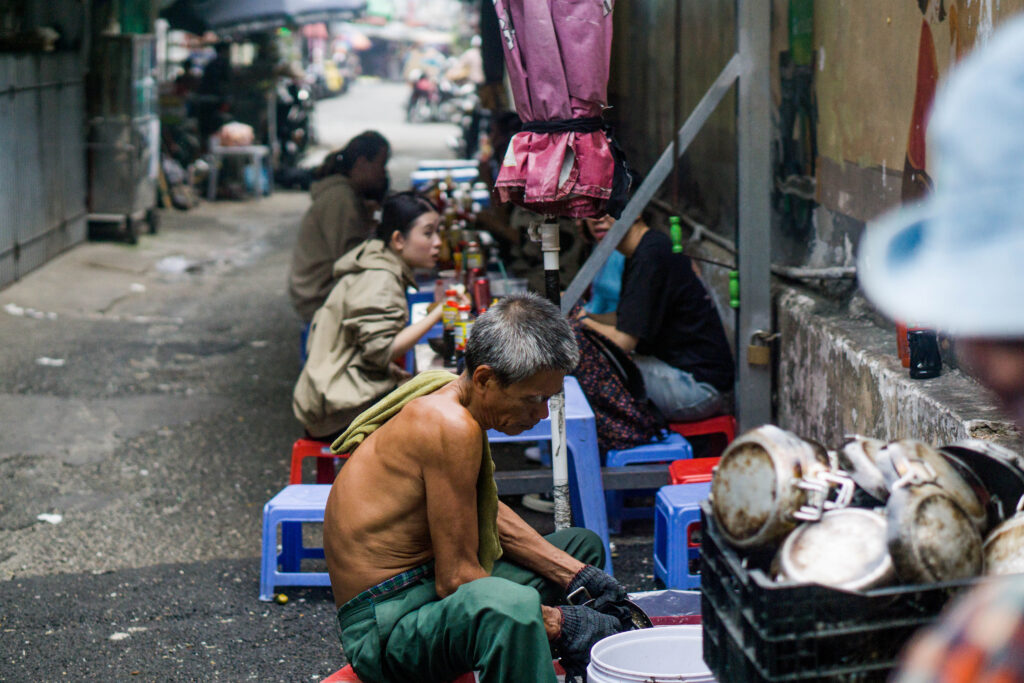
One of Vietnam’s biggest appeals is its affordability. Travelers of all budgets can enjoy high-quality experiences without breaking the bank. Comfortable accommodation, delicious meals, and transportation options are all surprisingly affordable. A hearty street food meal costs just a few dollars, and even luxury travelers will find excellent value for money. Vietnam’s efficient domestic transport system—buses, trains, and budget airlines—makes it easy to explore both its iconic destinations and off-the-beaten-path gems.
Growing Popularity Among Global Travelers

Over the past decade, Vietnam has rapidly gained popularity as a must-visit destination, thanks to its dynamic mix of tradition and modernity. Cities like Ho Chi Minh City and Hanoi now boast a growing number of English-speaking locals, trendy cafes, and international-standard services, making travel for non-Vietnamese speakers more accessible than ever. From adventurous solo backpackers to families seeking a cultural getaway, Vietnam caters to a wide range of travel preferences.
A Warm Welcome
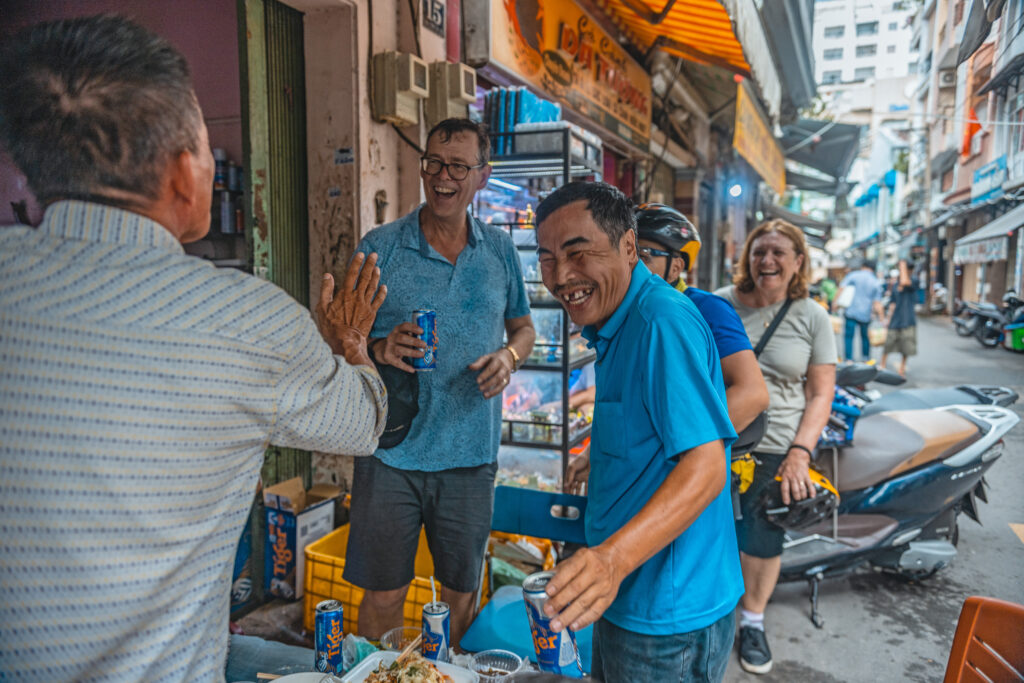
One of the greatest joys of traveling in Vietnam is meeting Vietnamese people. Known for their warmth and friendliness, the locals are often more than willing to assist, even when language barriers exist. Whether it’s a shopkeeper pointing you to the right street or a fellow passenger helping you figure out a bus route, kindness is a language that transcends words.
A Journey That Stays with You
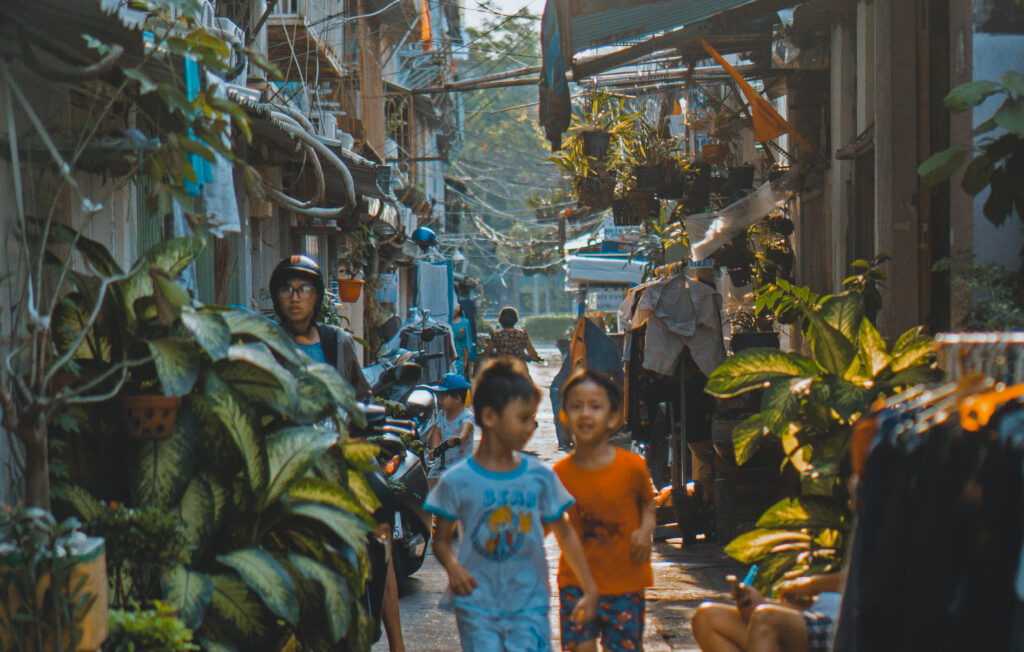
Vietnam offers more than just a trip; it’s an experience that will leave a lasting impression. Its mix of natural beauty, cultural depth, and culinary excellence ensures that every traveler finds a piece of Vietnam to fall in love with.
So, why visit Vietnam? Because it promises an adventure filled with history, flavor, and stunning landscapes. And don’t let the language barrier deter you—this captivating country is ready to welcome you, no matter where you’re from or what language you speak.
Is It Possible to Travel Without Speaking Vietnamese?
The short answer is: Yes, it’s absolutely possible to travel to Vietnam without speaking Vietnamese! Whether you’re exploring the vibrant streets of Ho Chi Minh City, relaxing on the beaches of Da Nang, or venturing into the scenic countryside, Vietnam is a welcoming destination even for travelers unfamiliar with the local language.
Navigating the Language Barrier
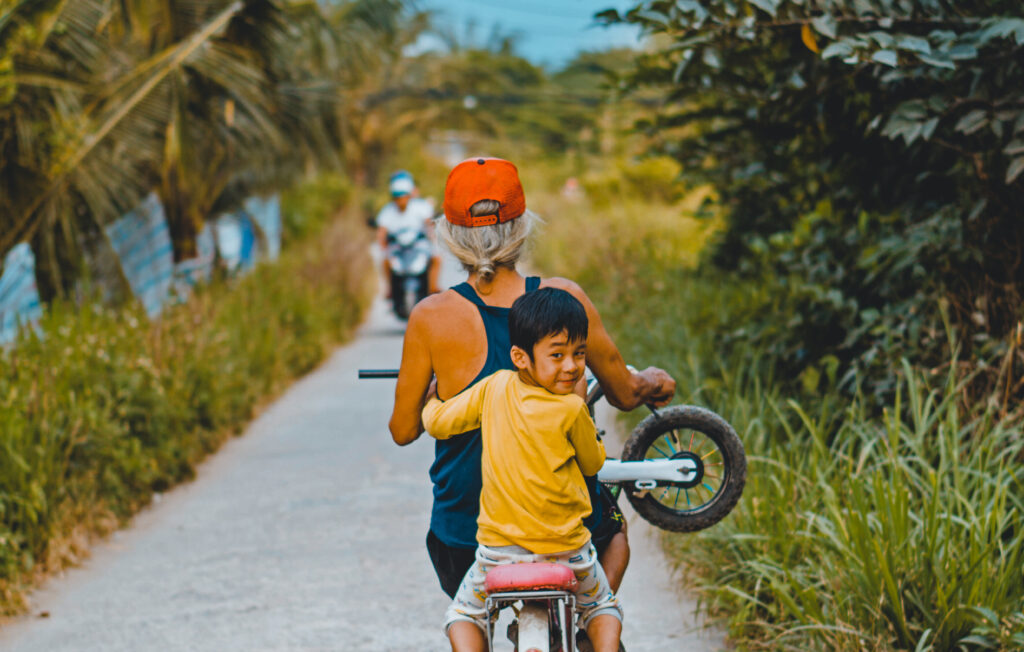
While Vietnamese is the official language, English has become increasingly common, especially in urban areas and popular tourist destinations. In cities like Ho Chi Minh City, Hanoi, and Da Nang, you’ll find that many people in the hospitality and tourism industries—hotel staff, tour guides, and restaurant employees—can communicate effectively in English. English signs and menus are also widely available in these areas, making it easier for non-Vietnamese speakers to navigate their travels.
That said, rural areas and smaller towns may pose more of a challenge, as English proficiency is less widespread. Here, you might encounter situations where communication requires a bit of creativity, such as pointing at menus, using translation apps, or relying on body language. But don’t worry—Vietnamese people are known for their friendliness and willingness to help, which can make these moments less stressful and even fun.
Overcoming Common Challenges
Traveling without speaking the local language does come with some hurdles, but they are manageable with a bit of preparation:
- Transportation: Public transportation systems, such as buses and trains, often lack English signage in rural areas. Apps like Grab (a ride-hailing service) can be a lifesaver in cities, while maps and translation tools can help you navigate elsewhere.
- Dining: Street food is a highlight of any trip to Vietnam, but many vendors speak little or no English. Pointing to dishes, using a few basic Vietnamese phrases, or showing pictures can make ordering a breeze.
- Cultural Nuances: Understanding local customs, such as how to greet people or show respect, can enhance your trip. Learning a few key phrases or gestures will go a long way in bridging the cultural gap.
The Key to Enjoying Vietnam
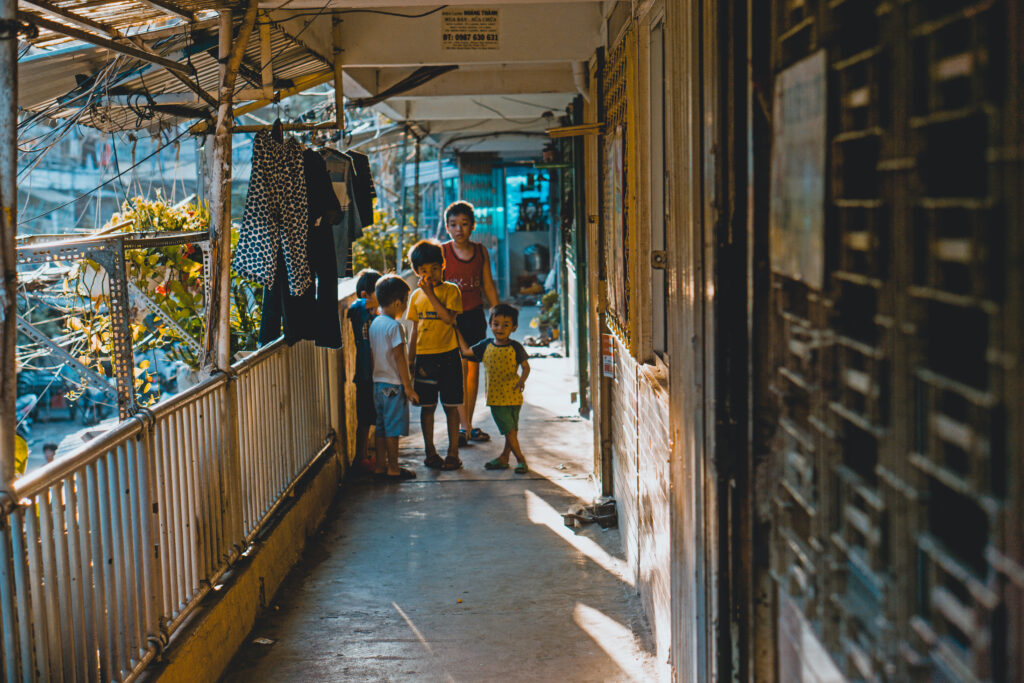
Ultimately, the key to enjoying Vietnam without speaking the language lies in your attitude. With a sense of adventure, an open mind, and a bit of patience, you’ll find that the language barrier is more of a small hurdle than a significant obstacle. The beauty of Vietnam lies in its people, culture, and experiences, which transcend words.
So, if the thought of a language barrier has been holding you back, don’t let it! Vietnam is ready to welcome you with open arms, no matter what language you speak.
Practical Tips for Navigating Vietnam Without Speaking Vietnamese
Traveling to Vietnam without knowing the language might seem like a challenge, but with a few handy tools and a bit of preparation, you’ll find it’s an adventure worth taking. Here are some practical tips to help you communicate, get around, and make the most of your trip—even if you don’t speak Vietnamese.
Communication Tools
Let’s face it: your phone is going to be your best friend when it comes to bridging the language gap. With just a couple of essential tools, you can handle almost any situation:
- Google Translate: This app is a lifesaver. Use it to translate text, have basic conversations, or even decipher menus and signs using the camera feature.
Pro tip: download the Vietnamese language pack for offline use—it’s a game-changer when internet access is spotty.
-
- Notes App on Your Phone: Save important phrases, addresses, and key information in your notes. For instance, jot down your hotel’s address in Vietnamese or phrases like “Toi muon di den day” (I want to go here) so you can quickly show them to a taxi driver or local.
- AI translation app: Apps like DeepL and Papago are excellent for translating more complex sentences or having smoother real-time conversations. They’re particularly helpful if you want to ensure your message is culturally appropriate.
Pro Tip: Get a local SIM card with data as soon as you arrive. It’s affordable and ensures you’ll always have access to translation tools and navigation apps.
Learning Key Phrases
Greetings and Politeness:
- Xin chao! (Hello!)
- Cam ơn (Thank you)
- Da, vang (Yes)
- Khong (No)
- Lam on (Please)
- Xin loi (Sorry)
Everyday Interactions:
- Toi khong noi duoc tieng Viet (I don’t speak Vietnamese)
- Ban co the noi tieng Anh khong? (Can you speak English?)
- Bao nhieu tien? (How much does it cost?)
- Nha ve sinh o dau? (Where is the restroom?)
- Toi muon mua cai nay (I want to buy this)
Dining:
- Mon nay la gi? (What is this dish?)
- Khong cay, lam ơn (Not spicy, please)
- Toi bi di ung voi… (I’m allergic to…)
Locals appreciate even the smallest effort to speak their language, and it often leads to warm smiles and better service. Don’t worry about getting the pronunciation perfect—your effort is what counts!
Body Language and Gestures
- Pointing: If you’re ordering food or asking for directions, pointing to a dish, item, or spot on a map works wonders.
- Smiling: A warm smile can break the ice and make any interaction friendlier. Vietnamese people are known for their kindness and will likely respond with patience.
- Thumbs Up or Nods: These simple gestures are universally understood and great for signaling approval or understanding.
- Writing or Showing Numbers: Use your phone’s calculator or a piece of paper to write down numbers when discussing prices or quantities.
Many travelers find that these gestures make interactions fun, and sometimes, they even lead to heartwarming stories of connection. One traveler shared how a simple thumbs-up after a delicious meal led to the chef bringing out a surprise dessert—proof that kindness transcends language!
Navigating Menus and Directions
Vietnam’s vibrant streets and culinary scene are part of its charm. Here’s how to navigate menus and directions like a pro:
Menus:
- Street Food Stalls: Many local vendors don’t have English menus. If in doubt, use Google Translate’s camera function or point to the dish being enjoyed by other diners.
- Restaurants in Tourist Areas: Look for places with picture menus or English descriptions. If you’re feeling adventurous, try saying “Mon nao ngon?” (What is delicious?) and see what they recommend.
- Dietary Needs: If you have special requirements, prepare translations like “Toi an chay” (I’m vegetarian) or “Khong cay, lam ơn” (Not spicy, please).
Directions:
- Ride-hailing Apps: Grab is your go-to app for getting around cities like Ho Chi Minh City and Hanoi. Just input your destination in English, and you’re good to go.
- Maps: Download apps like Google Map or Offline Map Navigation with offline areas before your trip. If you’re headed to a place with slow internet, expensive mobile data, or no online access, you can save an area from these apps to your phone or tablet and use it offline.
- Ask for Help: If you get lost, show locals your destination in Vietnamese (saved in your Notes app). They’re often happy to assist, even if they don’t speak English.
Pro Tip: Always carry your hotel’s business card or address written in Vietnamese. It’s a lifesaver when you need to find your way back or communicate with a taxi driver.
Traveling to Vietnam without speaking the language might feel like stepping out of your comfort zone, but that’s where the magic happens. Armed with these tools, a few phrases, and a friendly attitude, you’ll not only overcome the language barrier but also create memories that will last a lifetime. Don’t be afraid to embrace the adventure—it’s all part of the journey!
The English Situation in Vietnam

When planning a trip to Vietnam, understanding the level of English proficiency across the country can help ease concerns about communication. While the language barrier might feel intimidating at first, you’ll be pleasantly surprised at how manageable it is, especially in urban areas and tourist hotspots.
Cities vs. Rural Areas
English proficiency in Vietnam varies significantly depending on where you go.
- Urban Areas: Major cities like Ho Chi Minh City, Hanoi, Da Nang, and Nha Trang are far more English-friendly than rural regions. In these urban hubs, you’ll find that many locals, especially those working in the hospitality, retail, and tourism industries, have at least a basic understanding of English. Taxi drivers, shopkeepers, and restaurant staff are often accustomed to interacting with international travelers and can communicate essential information effectively.
- Rural Villages and Small Towns: In contrast, English is much less common in the countryside or smaller towns. Here, locals primarily speak Vietnamese, and communication might rely more on gestures, translation apps, or a few basic Vietnamese phrases. That said, the warmth and friendliness of the people make up for any language barriers, as they’re often eager to assist visitors.
- Tourist Hotspots: Areas around famous attractions such as Halong Bay, Hoi An Ancient Town, and Cu Chi Tunnels are generally equipped to handle English-speaking tourists. Guided tours, ticket counters, and nearby restaurants typically have English-speaking staff, and signs or instructions are often provided in English.
Reassurance for Travelers: While rural areas may pose more of a challenge, sticking to major cities and tourist destinations ensures you’ll find enough English support to make your trip smooth. Even in rural settings, a mix of translation apps, gestures, and friendly locals will help you navigate comfortably.
Hospitality Industry
One of the reasons Vietnam has become such a popular destination for international travelers is its well-developed and accommodating hospitality industry. Whether you’re staying at a budget guesthouse or a five-star resort, you’ll find that most staff are prepared to assist English-speaking guests.
- Hotels: In tourist-friendly cities, hotels range from boutique accommodations to luxury resorts, and their staff often speak functional English. Front desk employees, in particular, are trained to assist with check-ins, transportation arrangements, and local recommendations. Some even offer maps and guides in English to help you explore.
- Restaurants: Tourist-focused restaurants and cafes usually have English menus, and many staff members can explain dishes or recommend popular items. In major cities, trendy cafes and international chains are especially English-friendly. Even at local eateries, pointing to menu items or using Google Translate ensures you can order with ease.
- Tours and Guides: Joining a guided tour is one of the easiest ways to explore Vietnam’s attractions without worrying about language. Most tours—whether they’re through urban neighborhoods, scenic countrysides, or cultural landmarks—are led by guides who are fluent in English. They can enrich your experience by explaining local history, customs, and hidden gems.
A Note About Airports and Transport: English is commonly spoken at airports, train stations, and bus terminals in urban areas, with signs often displayed in both Vietnamese and English. Staff members in these locations are accustomed to assisting international travelers.
Vietnam’s growing tourism industry has created an environment where English is widely used in places travelers frequent. While rural areas may require a bit more patience and creativity, urban centers and hospitality hubs are well-equipped to make English-speaking visitors feel welcome and understood. Rest assured, language barriers won’t stop you from experiencing the beauty, culture, and adventure Vietnam has to offer.
The Benefits of Trying to Speak Vietnamese
Building Connections with Locals
Vietnamese people are known for their friendliness and hospitality. When you attempt to speak their language, it shows respect for their culture and creates an immediate bond. Even simple phrases like “Xin chao” (Hello) or “Cam ơn” (Thank you) can break the ice and make your interactions more meaningful.
- Earn Smiles and Kindness: A small effort to greet someone in Vietnamese often results in smiles and enthusiastic responses. Locals may even teach you more words or phrases, turning a casual interaction into a fun cultural exchange.
- Feel More Welcome: Speaking a few words in Vietnamese signals your genuine interest in the local culture. This can lead to friendlier service at restaurants, extra care from tour guides, or helpful tips from shopkeepers.
Enriching Your Travel Experience
Learning and using Vietnamese phrases allows you to immerse yourself more deeply in the culture. It transforms you from just a visitor to someone actively participating in the local way of life.
- Better Deals While Shopping: Speaking a bit of Vietnamese when bargaining at markets can work in your favor. Vendors are often more willing to negotiate or offer discounts to travelers who make an effort to communicate in their language. For instance, saying “Bao nhieu tien?” (How much is this?) might earn you a better price than just pointing and asking in English.
- Uncover Hidden Gems: Locals are more likely to share insider tips, recommend lesser-known spots, or even invite you to experience something special if they see you’re trying to connect in their language.
- Deeper Cultural Understanding: Language is a window into culture. By learning Vietnamese words and phrases, you’ll gain insights into local traditions, food, and even humor. Understanding the meaning behind words can add depth to your travel stories.
The Joy of Speaking Vietnamese
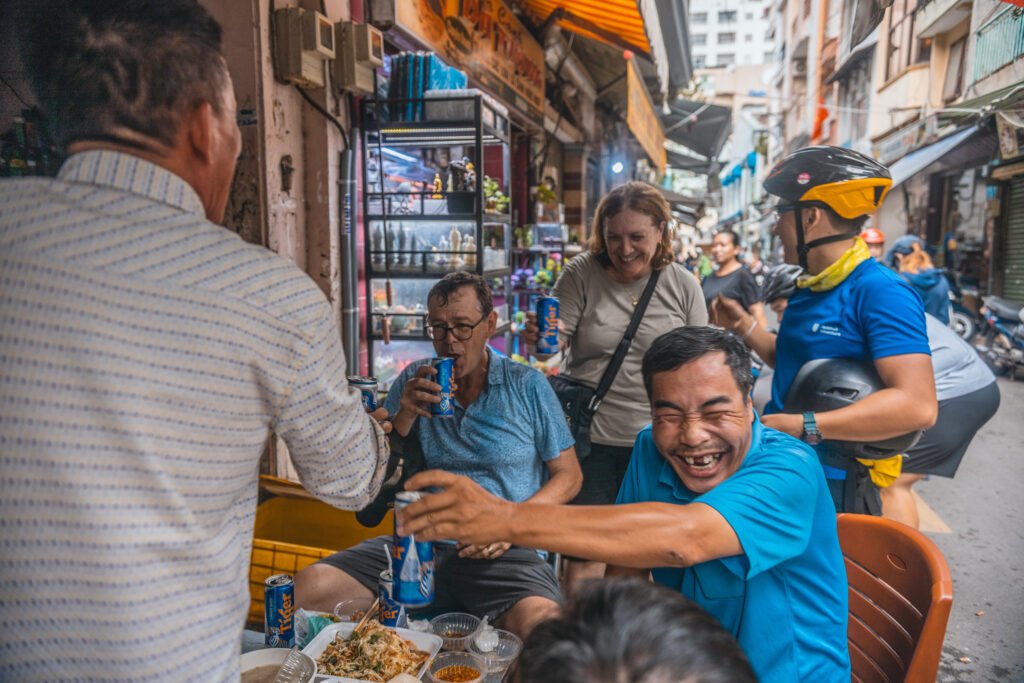
When you speak even a little Vietnamese, it can turn ordinary moments into extraordinary memories. A traveler once shared how they greeted a market vendor with “Xin chao!” and complimented the food with “Ngon qua!”—only to be rewarded with a warm laugh, a handshake, and a few extra spring rolls “on the house.”
These moments of connection can make your trip unforgettable, creating a deeper bond with the people and places you visit. So, while translation apps are handy, don’t miss the chance to connect through the power of language—it’s a gift that works both ways.
Must-Know Travel Hacks
Traveling to a country where you don’t speak the language might seem intimidating, but with a few clever hacks, you can make your trip to Vietnam smooth, stress-free, and even more enjoyable. Here are some must-know tips to navigate the country like a seasoned traveler.
Always Carry a Hotel Business Card
One of the simplest yet most effective travel hacks is to always carry a business card from your hotel. These cards typically include the hotel’s name, address, and phone number in both English and Vietnamese.
- Why It’s Important: If you get lost, you can show the card to a taxi driver, Grab driver, or a helpful local to guide you back. This is especially useful in areas where English isn’t widely spoken.
- Pro Tip: Snap a picture of the card on your phone in case you lose it.
Use Pictures or Pointing to Order Food

Vietnam’s incredible street food culture is one of its highlights, but many local vendors don’t speak English. Here’s how you can still enjoy the best dishes:
- Look for Visual Menus: Many food stalls and casual restaurants display pictures of their dishes, making it easier to choose. Simply point to the item you want.
- Use Pictures on Your Phone: If you’re craving something specific, show a picture of the dish on your phone (e.g., pho or banh mi). Apps like Google Images or Pinterest are great for this.
- Watch What Others Are Ordering: If you see something delicious at another table, point to it and say “Tôi muon mon nay” (I want this dish).
Pro Tip: Learn to say “Ngon qua!” (So delicious!)—it’s a fun way to compliment the chef and might even earn you extra hospitality.
Rely on Local Tour Guides
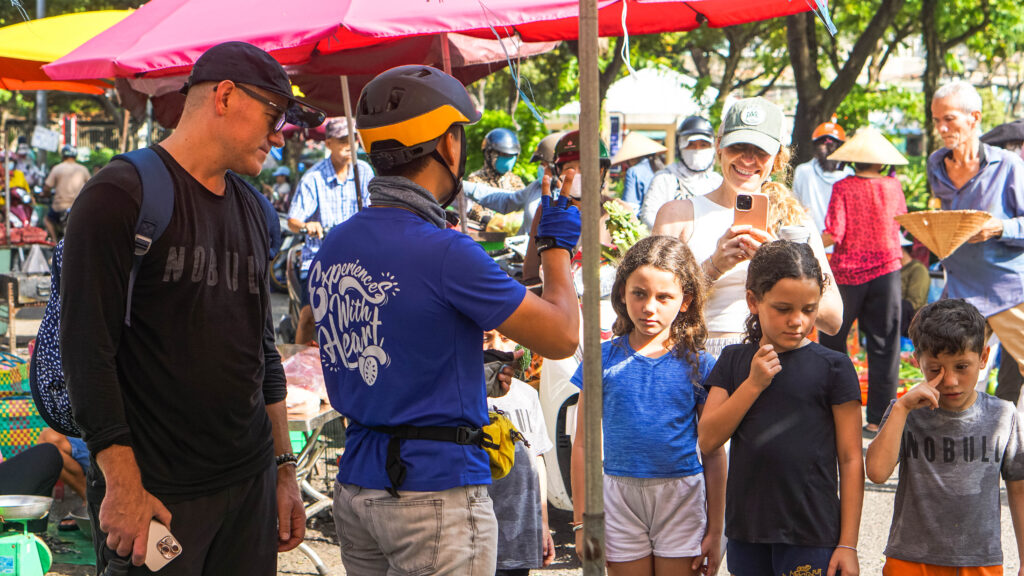
A knowledgeable local guide can make your trip infinitely more enjoyable by helping you bridge language and cultural gaps.
- Why It’s Worth It: Guides not only explain the history and significance of places but also handle any communication challenges, ensuring you can relax and focus on enjoying the experience.
- Where to Find Guides: Many hotels and travel agencies offer guided tours, often with English-speaking guides. For a more personal touch, consider booking through platforms like Airbnb Experiences or hiring a local guide via reputable websites.
Use Ride-Hailing and Navigation Apps
Getting around in Vietnam is easy with the right apps. Ride-hailing apps like Grab are widely used and can save you the hassle of negotiating fares with taxi drivers.
- Ride-Hailing: Simply input your destination in English, and the app will do the rest. You’ll also see an estimated cost upfront, making it convenient and stress-free.
- Offline Navigation: Download maps on apps like Google Maps before your trip so you can navigate even without internet access.
Pro Tip: When using taxis, insist on metered cabs from reputable companies like Vinasun or Mai Linh to avoid overcharging.
Pack Essentials for Easy Communication
Prepare a few tools to simplify your travel experience:
- Translation App: Google Translate is indispensable. Download the Vietnamese language pack for offline use.
- Notebook and Pen: Sometimes, writing or drawing can be quicker than explaining. For instance, sketching a bowl or pointing to the word “vegetarian” (chay) can help convey your needs.
- Calculator App: Use it to show numbers when bargaining or discussing prices.
Stay Flexible and Patient
When traveling in Vietnam, unexpected situations might arise—directions can get lost in translation, or your dish might not be exactly what you ordered. Approach these moments with a sense of humor and adventure.
- Why It’s Helpful: Most locals are warm and understanding, and a little patience can turn challenges into memorable stories.
- Pro Tip: Smile often—it’s a universal gesture that breaks down barriers and makes interactions friendlier.
These simple travel hacks will not only help you overcome language barriers but also enrich your journey, allowing you to explore Vietnam with confidence. With a bit of preparation and a curious spirit, you’ll find that every interaction—whether at a street food stall or in a bustling market—adds to the joy of discovering this incredible country.
Real-Life Stories from Travelers
Navigating Vietnam without speaking the language can seem daunting, but countless travelers have proven it’s more than doable—and often leads to memorable experiences. Take, for instance, the story shared in these Youtube videos, where a traveler recounts their journey through Vietnam using only gestures, translation apps, and a sense of adventure.
Their encounters showcase how friendly and helpful Vietnamese locals can be, whether it’s assisting with directions, recommending dishes, or simply sharing a smile. The video also highlights the importance of preparation, like downloading offline maps and learning basic Vietnamese phrases, to ensure smooth and enjoyable travels.
Want to hear more inspiring stories? Check out the video to see how embracing the language barrier can transform your trip into an unforgettable adventure!
Final Verdict
Traveling to Vietnam without knowing Vietnamese is absolutely doable—and it’s an adventure worth taking. From bustling cities like Ho Chi Minh City and Hanoi to the tranquil beauty of rural landscapes, this incredible country offers experiences that transcend language barriers.
Here’s what we’ve learned:
- English Accessibility: Urban areas and tourist hubs are well-equipped to accommodate English-speaking visitors, with many locals in the hospitality industry able to assist.
- Practical Tools: Apps like Google Translate and simple strategies like using pictures, gestures, or a hotel business card make navigating the language barrier seamless.
- Efforts Go a Long Way: Learning even a few Vietnamese phrases can enrich your trip, helping you connect with locals, uncover hidden gems, and enjoy better interactions.
- Travel Hacks: Smart tips like relying on local tour guides, ride-hailing apps, and offline maps ensure a smooth and enjoyable journey.
Vietnam’s charm lies not only in its breathtaking landscapes, rich culture, and delicious food but also in the warmth and hospitality of its people. The language barrier might seem daunting, but it often adds to the adventure, creating opportunities for cultural exchange and unforgettable memories.
So pack your bags, download those translation apps, and get ready to embrace a journey filled with surprises, connections, and incredible stories. Vietnam is ready to welcome you—language barrier or not!
Let’s Wrap It Up
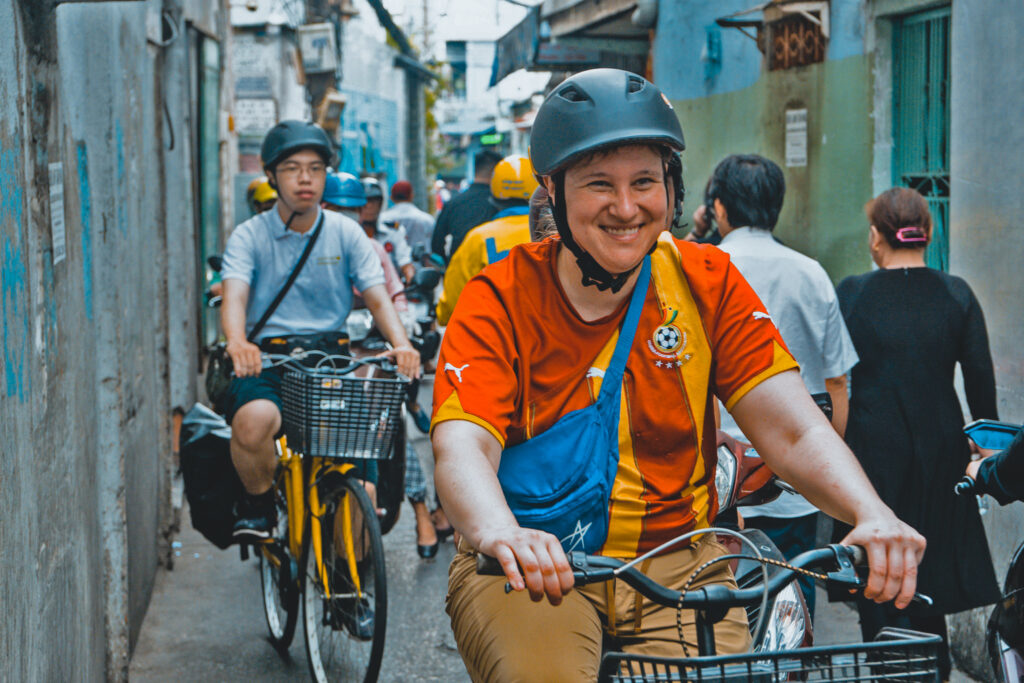
Traveling to Vietnam without speaking the language is not only possible but also an adventure filled with surprises, connections, and unforgettable experiences. Whether you’re exploring bustling cities, indulging in mouthwatering street food, or marveling at stunning natural landscapes, Vietnam welcomes you with open arms—even if you don’t know a single word of Vietnamese.
Do you have concerns about navigating the language barrier? Or perhaps you’ve already traveled to Vietnam and have some tips or stories to share? We’d love to hear from you! Drop your questions, experiences, or advice in the comments below.
So, what are you waiting for? Ready to explore Vietnam? Pack your bags, download a few handy apps, and get ready for a journey that will leave you with cherished memories and plenty of stories to tell. Vietnam awaits—your adventure starts now!
For more ways to explore Vietnam, check out our other articles:
- 25 unusual things to do in Ho Chi Minh
- 12 must-do tours in Ho Chi Minh
- 26 highlights in Ho Chi Minh’s Chinatown
- 20 Things To Do In Ho Chi Minh City At Night
- 25 Things to Do with Kids in Ho Chi Minh City
- A Complete Guide to Cycling in Vietnam
Ho Chi Minh City Cycling Tour In Ho Chi Minh City (Saigon) – Vietnam
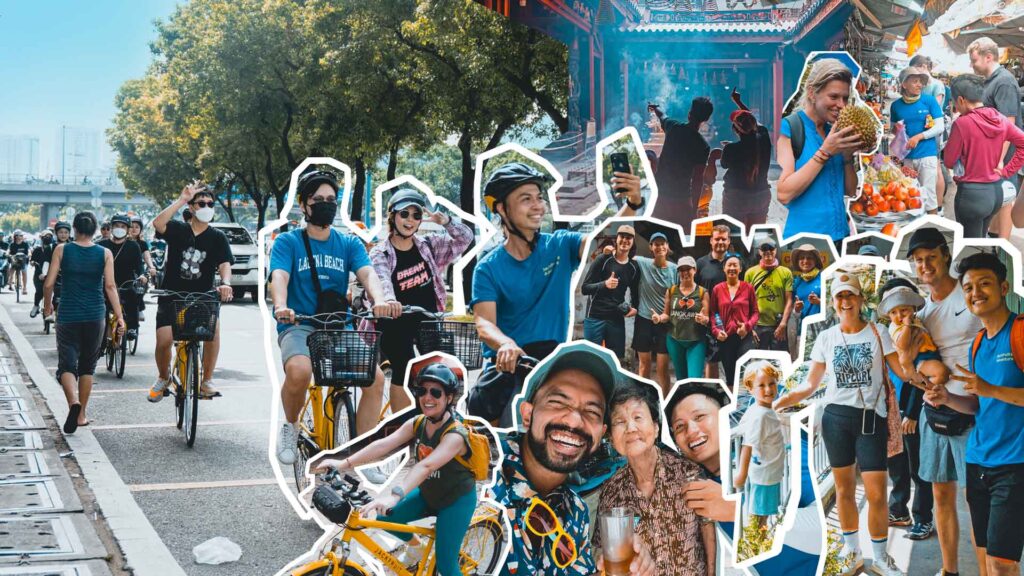
At Jackfruit Adventure, we organize Ho Chi Minh City Cycling Tour and Team Building Ho Chi Minh. With a deep knowledge of Saigon city and local connections, we believe we can give you an awesome bonding time together. Contact us today if you have any requests or questions to prepare a trip for your team to bond in Ho Chi Minh – Vietnam.




